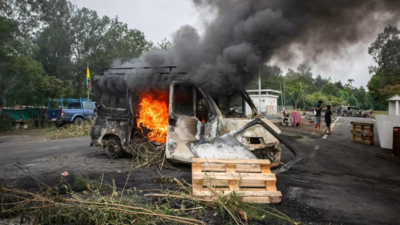The French security forces are escalating efforts to restore control in New Caledonia, a French Pacific archipelago, amidst ongoing unrest. This article discusses the recent developments, including government actions, the underlying causes of the unrest, and the broader political context of New Caledonia.
French Security Forces’ Operations
- Clearing Barricades: Using armored vehicles and construction equipment, security forces have cleared nearly 60 barricades on the RT1 highway connecting Nouméa to La Tontouta airport.
- Deployment of Gendarmes: Over 600 gendarmes have been deployed in a major operation to reopen the airport and restore disrupted supply chains.
- State of Emergency and Curfew: Authorities have imposed a state of emergency, a nightly curfew from 6 pm to 6 am, and granted emergency powers to security forces.
Political Responses
- Warning by High Commissioner: High Commissioner Louis Le Franc warned of new raids on independence strongholds to restore order.
- Commitment of Government: Interior Minister Gérald Darmanin affirmed the government’s commitment to regaining control of the highway and stabilizing the region.
- Emergency Council Meetings: President Emmanuel Macron convened emergency defense and security council meetings to address the crisis.
Underlying Causes of Unrest
- Voting Reforms: The unrest was triggered by the debate and approval of voting reforms by the French legislature in Paris, particularly concerning residents’ eligibility for provincial elections.
- Opposition by Pro-Independence Supporters: Pro-independence supporters, especially the indigenous Kanak population, fiercely oppose the voting reforms, fearing a dilution of their political influence.
- Historical Context: New Caledonia has a history of tension between its indigenous Kanak population and European settlers, with ongoing debates over its political status.
Implications and Challenges
- Deep-Rooted Divisions: The unrest reflects deep divisions within New Caledonia’s society, shaped by historical grievances and differing visions for its future.
- Political Identity: Balancing democratic representation with the protection of indigenous rights poses significant challenges.
- Uncertain Future: The long-term resolution of New Caledonia’s political status remains uncertain, with implications for governance and social cohesion.
Multiple Choice Questions (MCQs):
- What measures have French security forces taken to restore control in New Caledonia?
- a) Deploying over 600 firefighters
- b) Imposing a state of emergency and nightly curfew
- c) Providing financial aid to affected businesses
- d) Holding peace talks with independence supporters
- Answer: b) Imposing a state of emergency and nightly curfew
- What was the immediate trigger for the recent unrest in New Caledonia?
- a) Economic recession
- b) Passing of voting reforms in the French legislature
- c) Natural disaster
- d) Ethnic conflicts
- Answer: b) Passing of voting reforms in the French legislature
- Who primarily opposes the voting reforms in New Caledonia?
- a) European settlers
- b) Australian and New Zealand authorities
- c) Indigenous Kanak population
- d) French government officials
- Answer: c) Indigenous Kanak population
- What is one of the challenges highlighted by the unrest in New Caledonia?
- a) Lack of infrastructure support
- b) Political instability in the region
- c) Balancing democratic representation with indigenous rights
- d) Language barriers
- Answer: c) Balancing democratic representation with indigenous rights
